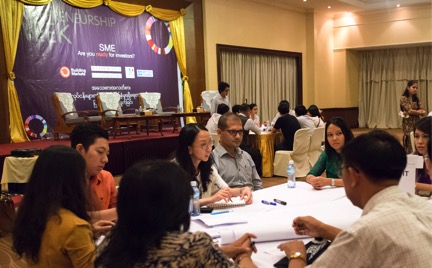The adoption of the microfinance law in 2011 led to a rapid influx of microfinance institutions (MFIs) in Myanmar. In December 2015 there were more than 256 MFIs operating in Myanmar, all competing to break the estimated 33 million unbanked people residing here. They are charging exorbitant interest rates moneylenders believes will become obsolete, such as the poor, when given the option of using an MFI, it will take this opportunity.
fans trumpet the benefits of microfinance, some even that is seen as a silver bullet to eradicate poverty. It may not be a silver bullet, plus a silver lining. It provides a valuable tool to help businesses affected by poverty. It provides credit to the traditional banking system fails by facilitating consumption, financing of micro driving growth and create jobs and, with the help of other inputs, plays a vital role in reducing poverty.

There trials benefits in Myanmar. Jason Meikle, deputy director of Covenant Global Fund Microfinance (PGMF), operating in Myanmar since 1997, lists of “improved housing, better nutrition and food in yangon, improved investment and education, better management and improved positioning women of the house and the people “in areas where there GFMP.
The impact is probably influenced by the participation of GFMP with the communities they serve. Before extending micro credit potential customers attend five courses of business training “to get into the mindset of what companies they want to do … and the importance of building savings.” Building a relationship with the community in which he works is also important; MFIs can not expect to distribute funds indiscriminately and reap the rewards.
Bunsocheat Kim, CEO of ACLEDA MFI Myanmar, operating in Myanmar since 2012, also spoke about the importance of relationships. “You have to know the culture and the real situation [in which they operate]. If you do not know this, then it can not be sustainable”.
ACLEDA contribute its extensive experience working in Cambodia, but still Bunsocheat preaches the importance of time to build trust and cultivate relationships with their customers in a new market.
How GFMP, ACLEDA dissemination of technical knowledge to its customers. Bunsocheat believes that knowledge is “atomic” in which knowledge is transmitted from its core, the IMF, its customers and then in the wider community.
Microfinance is still an evolving concept of SMEs in Myanmar. The adoption of the microfinance law has led to a wave of MFI eager to work, overcrowded regions like Yangon, leaving many rural areas not served. And ‘the task that 50 percent of MFI clients’ must be in rural areas, but this is not true. tapas loan last imposed by the Oversight Committee Microfinance had to be modified due to protests from the IMF. MFIs, particularly those administered locally, has strict rules when it comes to raising capital that inhibit growth, as only they are allowed to borrow from local banks requiring almost prohibitive amount warranty.
Overindebtedness of borrowers currently is not being monitored in Myanmar, which could lead to tragic consequences. Currently customers can borrow from most MFIs, which could accumulate unsustainable amounts of debt. There is little information exchange between MFIs information or a credit bureau, where MFIs could see if a borrower has outstanding loans. New rules are needed to mitigate the debt overhang to protect both the borrower and the MFI.
Initiative should be careful to use technology, particularly mobile banking. cell proliferation throughout Myanmar is rapidly increasing, but mobile banking is currently underdeveloped. Meikle believes that the current regulation “is not favorable, and does not provide sufficient incentives” in order to succeed. It is unclear whether the current bank led model includes MFIs; it is imperative to include a “financial service” for mobile banking a success. The Central Bank of Myanmar has issued new rules for using the power of mobile banking to help extend banking services to the rural poor.
New MFIs, including profit operations, struggling to be sustainable in Myanmar. Most MFIs focus on populated regions of Yangon, Mandalay and Ayeyarwady, with the already great competition for customers. remotest regions that are not served by MFIs have high operating costs due to its remote location, due to the fact Myanmar has one of the lowest population density in Southeast Asia. Get a market share possible, but will have a significant investment of time and money.
Meikle, acknowledged honestly that the sustainability of GFMP ‘and’ been possible largely due to the extensive funding repayable received funding above, can be established without having to provide a financial return for investors. “Note the severe restrictions Take of interest rates “hinders the growth of the industry, and prevents new players coming” While I understand the need for rules to protect and improve the lives of local people. Meikle concludes “if you are doing commercial microfinance you should be doing for the people, not just as a way to make money. ”
Again Bunsocheat echoed this sentiment. “We need time, perhaps a decade, for the client to understand what the financial sector can do [for them].” As for profit ACLEDA MFI is finally here for the long term, understanding the path of profitability is complicated and slow. “You can crash,” warns Bunsocheat, unless you invest the time to learn about the culture and the real environment in Myanmar.
Microfinance has great potential in Myanmar to help alleviate poverty in partnership reforms. Poverty does not have a single source, and is unlikely to be a silver bullet to solve it. It is expected that all macroeconomic reforms, industrialization, promotion of exports and investment in health and education for the benefit of poor Myanmar.
With the strong mandate given to the part of the NLD, Aung San Suu Kyi in the recent elections, we believe the new government will put more emphasis on reducing rural poverty through smart policy and smart use technology. With this, microfinance will become an even more valuable tool in the fight against poverty in Myanmar.
Read Also : Asean Free Trade and Myanmar SMEs




